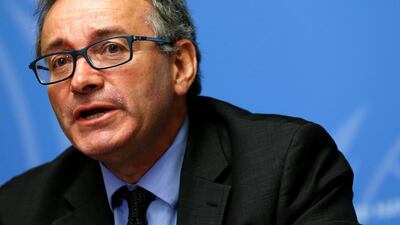People smugglers have developed a new “Go Now Pay Later” repayment scheme for migrants following a backlash from families forced to pay up front for perilous journeys only to see them end in Libya, a UN expert said on Wednesday.
The new offer on the market has proved popular with youngsters but they face being tracked by traffickers during their long journeys and tortured to ensure that relatives hand over the cash before the final step of the journey, British MPs were told.
The torture sessions were recorded on video which were then sent to relatives who were told to make payments, normally in the Middle East and sometimes in Europe, said Vincent Cochetel, special envoy for Mediterranean trafficking route for the UN High Commissioner for Refugees.
He said that the traffickers had identified young migrants travelling alone as a potentially lucrative source of revenue and were targeting them in social media messages. He said the UN was trying to counter the message with their own information programme – Telling the Real Story – targeting potential migrants from countries including Eritrea and Somalia.
“These are dangerous journeys that end up in prison in Libya or with loss of life in the desert,” Mr Cochetel told MPs, who are investigating how migrants end up travelling by boat to the UK from the coast of Northern France.
He said the adverts were part of a broader pattern of attracting customers. Covid-19 and increased security measures had contributed to a slowing of numbers of people crossing the Mediterranean.
The schemes included different payment plans including “Pay as you go” where migrants or their relatives handed over money after they reached different stages on their journeys.
Smugglers had initially demanded an up-front payment but “because many people disappear on routes leading to Libya, there was a reset in discussions between the diasporas and the traffickers”, he told the MPs in London via videolink.
The “Go now pay later” scheme had proved “incredibly attractive for many people including for children who think they will never have to pay something back”, he said.
But he said the size and international reach of the criminal gangs meant that the youngsters would be followed all the way along their journeys and they are ransomed on their way to Libya and in the country.
“The way it happens is those kids are normally tortured in front of a camera,” he said. “A video clip is sent to relatives asking them to pay.”
After they pay the money the “kids are released until they are ransomed again,” said Mr Cochetel.
Details of the schemes being run by the transnational crime gangs have emerged in court cases including a major trial in Ethiopia, he said.


